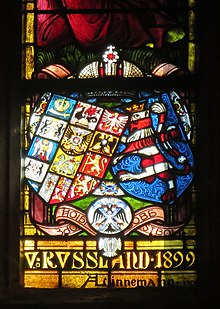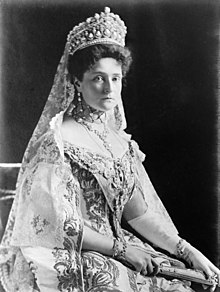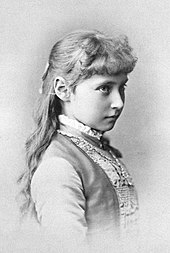Alix of Hessen-Darmstadt
Alix von Hessen-Darmstadt - completely Her Grand Ducal Highness Princess Alix Viktoria Helene Luise Beatrix of Hesse and near Rhine , VA - (* June 6, 1872 in the New Palace , Darmstadt , Grand Duchy of Hesse ; † July 17, 1918 in Yekaterinburg ) was the Grand Ducal Princess of Hessen-Darmstadt and through her marriage to the later Emperor Nicholas II as Alexandra Fjodorovna ( Russian Александра Фёдоровна ) the last Empress of Russia .
Early years
Alix was the sixth child and fourth daughter of Grand Duke Ludwig IV of Hesse and of the Rhine and Alice of Great Britain and Ireland , the second eldest daughter of Queen Victoria . She was baptized on July 1, 1872, her parents' wedding anniversary. Godparents were her uncle Albert Eduard, Prince of Wales and his wife Alexandra of Denmark , the future Tsar Alexander III. and his wife Dagmar of Denmark , Beatrice of Great Britain and Ireland , Auguste of Hesse and Maria Anna Friederike of Prussia . She was given the name Alix because, according to her mother, the name “cannot be so easily hereditary” as the name Alice “because my name is being killed here. It is pronounced 'Aliice' ”. She was given the other names in honor of her grandmother Queen Victoria and her English aunts, her mother's sisters.
Her mother had died of diphtheria in Alix's early childhood (1878), as did her little sister Marie Viktoria , known as "May". Her brother Friedrich Wilhelm (1870–1873), known as "Frittie", died of internal bleeding after a fall from a window, as he had inherited the hemophilia problem . Alix's father died when she was 20 years old. He was succeeded by Alix's brother Ernst Ludwig on the grand ducal throne. Her cousin was Kaiser Wilhelm II.
Due to the early death of her mother, Alix was very close to her grandmother Queen Victoria and grew up largely in Great Britain with her three sisters and brother. Victoria absolutely loved her granddaughter Alix because she was such a quiet little girl. Because of her cheerful nature, she was called "Sunny" in the family.
marriage

Alliance coat of arms of Tsar Nicholas II and Tsarina Alexandra Fjodorovna: Detail from a window donated by the Tsarina in the Friedberg town church
|
Alix married quite late for her class. Despite (or because of) great pressure from the family, Alix turned down a proposal from her cousin Albert Victor (the eldest son of the future King of Great Britain and Ireland, Edward VII ). Alix met her future husband Nikolaus , a second cousin, at the age of twelve at the wedding of her sister Elisabeth in 1884. Nikolaus' parents, Maria Feodorovna and Alexander III. , did not immediately agree to a marriage between the two. Alexander III Although she liked Alix's shy manner and appreciated her calm disposition, his mother saw only the German in her. The mother of the tsarina Maria, born as Princess Dagmar of Denmark, was a daughter of King Christian IX. and had had an aversion to the Germans since the Schleswig-Holstein War (1848–1851). In addition, she wanted for her son someone of a higher standing than a woman, a real princess in her eyes, daughter of a king, and not the daughter of a grand duke from the small duchy of Hesse. But her son adored Alix and was ultimately able to convince his mother.
Queen Victoria also had concerns about such a connection, as Russia did not seem worthwhile to her to establish connections on a political level. Queen Victoria, the grandmother of Europe , had married all of her daughters in such a way that, in the traditional sense, "threads" arose in the European countries and thus political relationships. It also assured her of some form of control. But the queen had already agreed to the marriage between Alix's sister Elisabeth and Grand Duke Sergei Alexandrovich , a pure love marriage. Finally she gave her blessing to Alix too.
Alix, very religiously influenced by the early death of his mother, had certain personal concerns about the conversion from the Lutheran to the Russian Orthodox Church, which was necessary for the marriage to Nicholas. The young tsarevich gave his bride plenty of time and put an Orthodox priest at her side, who instructed her in the doctrines of the faith and whose approval gave her courage. In addition, her sister Elisabeth assured her that she did not have to give up her faith and that she could combine both directions, the Evangelical and Orthodox faith.
The couple became engaged in Coburg in 1894 and married on November 26, 1894 in the Winter Palace in Saint Petersburg . By the standards of the time, the wedding was extraordinarily modest. Since only a few weeks before Alexander III. died suddenly, a pompous ceremony during the mourning would have been considered inappropriate. With her marriage and the conversion to the Russian Orthodox Church, Alix changed her first name to the Orthodox form Alexandra Feodorovna.
Empress Alexandra
After the death of Emperor Alexander III. Nicholas and Alexandra were crowned imperial couple in a very splendid ceremony. Nikolaus was only 25 years old at the time. The coronation ceremony and a subsequent festival for the population in a park were overshadowed by a mass panic with thousands of dead and injured, which was seen as a bad omen for the reign.
Alexandra was not particularly popular either at court or with the people, on the one hand because of her lack of social skills, on the other hand because of her German origins. She was always very shy, bit her lip at ceremonies for fear of making mistakes, and her French, a must at the Russian court, was so bad that the ladies-in-waiting joked about her failure days later. So she quickly withdrew from social events and took refuge in migraine attacks caused by her own insecurity. In addition, Rasputin's negative influence on the empress came in later years . The fact that she was a native German raised the suspicion during the First World War that there was a conspiracy at the Tsar's court aimed at a victory for the German Empire over the Russian Empire. All of this contributed significantly to the imperial family's loss of legitimacy before the revolution.
However, after a rather sluggish reception at the court, she did not feel particularly well either. She made little effort to establish closer contact with other members of the large Romanov family and took part in as few events as possible. The fact that she was always overshadowed by her very popular mother-in-law, Maria Feodorovna , did not help much to integrate herself better into the family. In addition, after four births she still had not given birth to a male heir to the throne.
Alexandra defended and strongly supported her husband's policies. Like him, she too was an advocate of divine grace and therefore felt that the people's political say in the form of an elected parliament (in Russia Duma ) was superfluous.
children
Nikolaus and Alexandra had four daughters and a son:
- Olga (born November 15, 1895)
- Tatjana (born June 10, 1897)
- Maria (born June 26, 1899)
- Anastasia (born June 18, 1901)
- Alexei (born August 12, 1904)
All five children were shot on July 17, 1918 in the Villa Ipatiev in Yekaterinburg .
Rasputin
On August 12, 1904 the long-awaited heir to the throne Alexei was finally born and Alexandra had fulfilled her main task. However, the joy was short-lived when it turned out that the Tsarevich suffered from haemophilia , which could only have been inherited from Alexandra. This genetic defect, which was still very dangerous at the time, was introduced into several European royal houses by Queen Victoria's daughters and granddaughters, including the Spanish royal family ( Victoria Eugénie von Battenberg ) and the German imperial family ( Irene von Hessen-Darmstadt , a sister of Alexandra). Alexandra herself had lost an uncle ( Leopold Georg, Duke of Albany ) and a brother to this illness. The fact that the heir to the throne, the only male heir to the Romanovs, suffered from this incurable disease was kept a secret from the Russian people.
Various Russian doctors and medical professionals were turned to treat Alexei. However, all of her treatments were of no use and Alexandra gave herself more and more to mysticism. A simple itinerant preacher had an unexplained success with his method, which was mainly based on prayers: Grigori Rasputin , whom she had met through her lady-in-waiting Anna Vyrubowa . In contrast to the doctors, he was able to heal a major injury to the Tsarevich. From 1912 onwards, the imperial family and especially Alexandra relied more and more on his healing abilities. Over time, his influence grew so great that he succeeded in subverting the political authority of the tsarist family during the First World War by gaining influence over the tsar through Alexandra. The Rasputin affair in particular made her hateful among the Russian nobility.
In the first World War

The outbreak of war was a defining moment for Russia and Alexandra. Russia turned against Germany, Alexandra's country of origin, where her brother was Grand Duke of Hesse. In addition, Kaiser Wilhelm II was her cousin. This made Alexandra even less popular with the Russian people, who accused them of collaborating with the Germans.
When Nikolaus traveled to the front in 1915 to take command of the Imperial Russian Army himself , he left Alexandra in charge. She wasn't very gifted at politics. She repeatedly fired old ministers and appointed new ones, so that the government was neither stable nor able to work efficiently. Among other things, this resulted in the fact that neither the troops nor the citizens were adequately supplied. Alexandra let herself be influenced more and more by Rasputin's selfish advice, so that at some point Alexandra was said to have had a relationship with him. It came more and more into the focus of rumors. She was even assumed to be a German spy. In 1916, Rasputin was murdered by his opponents from the Romanov family .
Nevertheless, the tsar supported his beloved wife against all allegations inside and outside the family.
revolution
In the February Revolution , the emperor was forced to abdicate. First he abdicated in favor of his son, but changed the deed of abdication in favor of his brother on the same day. The situation for Alexandra came to a head. Although he was the cousin of Alexandra and Nikolaus, King George V refused to evacuate the imperial family to Great Britain. He feared an impact on his own throne, as the tsarist couple were not very popular in their country either.
The Provisional Government put Nikolaus, Alexandra and their children under house arrest in the Alexander Palace in Tsarskoye Selo until they were deported to Tobolsk in Siberia in August 1917 , originally to keep them away from the capital and greater dangers. After the October Revolution, however, they were taken to Bolshevik- controlled Yekaterinburg , where they were housed in the Ipatiev House . The entire family, their doctor and three other servants were shot there in a cellar on the night of July 17, 1918 after several months of imprisonment. After the October Revolution of 1917, Russia withdrew from the war.
Identification and burial
The bodies of the imperial family were buried near an unused mine shaft called Ganina Jama , north of Yekaterinburg. In the early 1990s, after the dissolution of the Soviet Union , Romanov bodies were located, exhumed, and identified. A contemporary report found in the 1970s, but not published, helped with the localization. A DNA analysis helped identify them . A blood sample from Prince Philip (Alexandra's great-nephew) was used to identify Alexandra and her daughters. In 1998 Alexandra, Nikolaus and their children (apart from Alexei and one of the younger daughters (Maria or Anastasia), whose whereabouts had been unclear up to that point in time) were transferred to St. Petersburg, where they, also with the participation of President Boris Yeltsin , were transferred to St. great ceremony in the family crypt of the Romanovs in the Peter and Paul Cathedral. In 2007, the remains of the two missing children were finally identified using a DNA test, and they were also buried there. President Vladimir Vladimirovich Putin took part in this.
In 2000, she and her family were canonized by the Russian Orthodox Church .
ancestors
literature
- Otto Graf zu Stolberg-Wernigerode: Alexandra Feodorowna. In: New German Biography (NDB). Volume 1, Duncker & Humblot, Berlin 1953, ISBN 3-428-00182-6 , p. 196 f. ( Digitized version ).
- Olga Barkowez, Fyodor Fedorow, Alexander Krylow: "Peterhof is a dream ..." - German princesses in Russia. Berlin 2001, ISBN 3-86124-532-9 .
- Carolly Erickson: Alexandra Romanowa. The last tsarina. ISBN 978-3-492-04466-0 .
- Joachim Kühn: The diary of the last tsarina and her letters to Nicholas II. 1956.
- Elisabeth Heresch: Alexandra - tragedy and end of the last tsarina. 1993, ISBN 3-7844-2464-3 .
- Andrei Maylunas, Sergei Mironenko: A love for eternity - Nikolaus and Alexandra, the last couple of tsars. 1999, ISBN 3-7951-1646-5 .
- Greg King: Alexandra. The last Tsarina of Russia. Your life and your time. 1999, ISBN 3-547-75401-1 .
- Olga Vogt: Stories from the Rodina. A real life story. BS-Verlag, Rostock, ISBN 3-89954-209-6 .
- Silke Ellenbeck: “I wanted to marry a soldier and have twenty children.” Maria Romanow - the third daughter of the last Tsar Nikolaus II. DeBehr Verlag, Radeberg 2015, ISBN 978-3-95753220-6 .
Web links
- Literature by and about Alix von Hessen-Darmstadt in the catalog of the German National Library
- Newspaper article about Alix von Hessen-Darmstadt in the press kit of the 20th century of the ZBW - Leibniz Information Center for Economics .
- Russia, Empress Alexandra Feodorovna of. Hessian biography. (As of February 26, 2020). In: Landesgeschichtliches Informationssystem Hessen (LAGIS).
Individual evidence
- ^ Greg King: Alexandra. The last Tsarina of Russia. Your life and your time. 1999, p. 35.
- ↑ Manfred Hildermeier : The Russian Revolution 1905–1921 , Suhrkamp, Frankfurt 1989, p. 122.
- ^ Vladimir Solovyov: Victim of premeditated murder . In: Der Spiegel . No. 30 , 2008 ( online ).
| predecessor | Office | Successor |
|---|---|---|
| Maria Feodorovna | Empress of Russia 1894–1918 |
Title expired |
| personal data | |
|---|---|
| SURNAME | Alix of Hessen-Darmstadt |
| ALTERNATIVE NAMES | Alice of Hesse and by the Rhine; Victoria Alice Helena Louise Beatrice of Hesse and the Rhine; Alexandra Feodorovna |
| BRIEF DESCRIPTION | by marriage to Empress of Russia |
| DATE OF BIRTH | June 6, 1872 |
| PLACE OF BIRTH | Darmstadt |
| DATE OF DEATH | July 17, 1918 |
| Place of death | Ekaterinburg |





